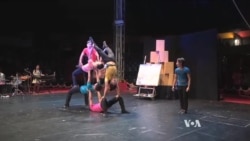When she was seven years old, Pin Phunam would wake at 4 a.m. and leave the house with her mother and siblings to pick up trash for recycling – plastic bottles, glass bottles, tin cans. Some of the money earned from scavenging went for food; much was taken by her father, a violent alcoholic.
He died six years later. By then Phunam, aged 13, was enrolled at the Phare Ponleu Selpak (PPS) school in the western city of Battambang, where many talented but poor or at-risk children can get an education and turn their lives around.
The school’s 1,000 students have the chance to study an unusually broad arts curriculum that includes visual arts, applied arts, animation, graphic design, theatre, dance, music and circus.
Phunam’s teacher encouraged her to join the school’s circus program. By then she’d tried her hand at painting and music, neither of which she liked.
“My teacher said: ‘You’re now growing up so you need to choose one skill for your life,’” Phunam said. “So I chose circus.”
Joining the Circus to Travel the World
Learning the array of skills required for a circus performer was punishing on her body but Phunam persevered, not least because she saw the reception the older children received.
“They would perform and everyone would laugh – I was proud of them and I wanted to be like them,” she said.
Today Phunam works at Phare the Cambodian Circus as a contortionist, just one of the skills she and the team employ to entertain the crowds: from juggling to tumbling, acrobatics to balancing.
Hard work and talent have taken them around the world. Standing outside the big top tent in Phnom Penh – where Phare’s troupe was performing at the Tini Tinou international circus festival – Phunam reeled off a list of countries she has visited, among them the United States, Italy, Germany, France, Japan, the Philippines and South Korea.
Art Therapy to Heal Cambodia’s Wound
Phare the Cambodian Circus is an offshoot of PPS. Each year 40 PPS students get the chance to learn circus skills in a 10-year program from which fewer than a dozen will graduate.
Huot Dara, who heads Phare the Cambodian Circus, said PPS was founded by Cambodians who returned from refugee camps in the early 1990s and saw the extent of the country’s social and economic problems.
“They had learned art therapy when they were in the refugee camps – [taught] by a French humanitarian worker – and they wanted to help rehabilitate the country by using art,” he said. “They started by using drawing and painting as the medium of expression.”
Later the founders set up a performing arts department. Two years ago Phare the Cambodian Circus started life. It has a distinct social business element, Dara said: to make PPS self-sustainable.
“To continue to open the door to welcome more than 1,000 students every day, to give these unique opportunities to young Cambodians mainly from the streets and from very difficult social and economic backgrounds,” he said. “[And] to take art and culture as a means to express themselves and to have a career, to earn a living, to improve their life and go out of poverty.”
The circus element has become one of the most popular tourist attractions in Siem Reap, “after the temples [of the Angkor Wat complex],” said Dara. “We are very proud of that.”
Life After The Circus
But the arts can be a tough career, he said, and the physical demands on performers mean most don’t stay in the trade for many years.
“We try to help them earn as much income as possible and help them to develop themselves into the future by later becoming a stage director, a writer, an artistic manager or join us in the social business,” said Dara.
Pin Phunam, who is now 23, regards PPS as a place where children on the margins, as she once was, can come and learn.
“But you are the one who decides which way you want to go,” she said. “You choose your way and you try hard for your life. They help you but they cannot help you for your own life, so it’s time for you to help yourself.”
At 23, Phunam’s days as a contortionist are coming to an end. Next she will study dance, arts and communications. Her biggest ambition, though, is to enter politics.
“Everyone says it’s crazy, but I don’t care – this is the dream and I want to go to that point,” she said. “Because I want people to know [that a] girl can have a dream and she will go to that dream – even if it’s hard but keep hope.”





